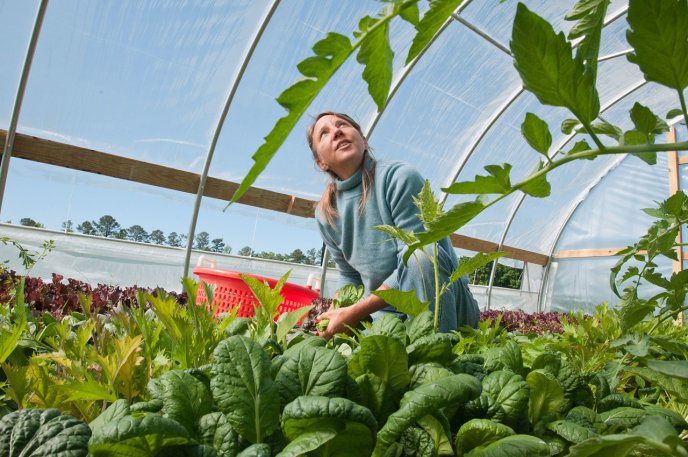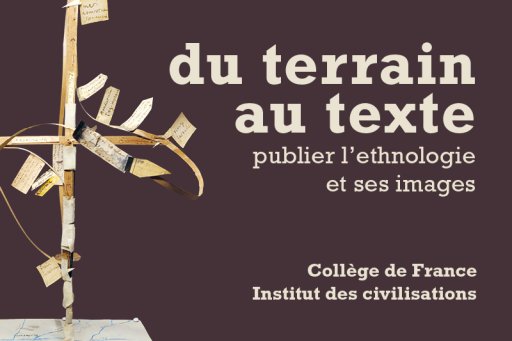In the face of climate change, researchers in a wide range of fields are attempting to understand and anticipate changes in agricultural practices. Gathered within the MATS project, an acronym for " Modeling Agricultural TransitionS " - modeling agricultural transitions, they are adopting innovative approaches.
On this May morning, they crowd the entrance to the Collège de France. A dozen researchers are attending a seminar organized by the MATS project, an acronym for " Modeling Agricultural TransitionS ", or " modéliser les transitions agricoles " in French. Hailing from universities in France, Switzerland, the Netherlands and the USA, these scientists come from a wide range of disciplines. They include researchers in finance, mathematics, econometrics, agricultural or environmental economics, and specialists in the agri-food sector... But they are all working on the same issue : the evolution of agricultural practices in a context of climate change. The project is led by mathematician Pierre-Louis Lions, Professor at the Collège de France and holder of the Partial Differential Equations and Applications Chair ; Delphine Lautier, Professor of Finance at Paris Dauphine University - PSL, and Bertrand Villeneuve, Professor of Economics at the same university. Starting in 2023, the work will be supported for three years by the Avenir Commun Durable initiative.
The need to change agricultural practices
The starting point for the project is a simple, albeit worrying, observation : the world's population is expected to reach 9.7 billion by 2050. To keep pace with this growth, food production will have to increase by 70 ... The agricultural sector also plays a central role in the ecological transition, through the greenhouse gas emissions it generates, and its impact on water resources and land use. At the same time, climate change is having an ever-increasing impact on agriculture and the lives of farmers themselves. For all these reasons, farming practices must evolve.
A complex system to study
The MATS project team will therefore attempt to understand and anticipate this necessary evolution, but the task is not an easy one. Researchers must first identify the many players in this sphere, and the interests of each. These include farmers, consumers, residents, political authorities and regulators, to name but a few. The scope of this research extends far beyond agricultural production to include other directly related markets, such as water, energy or financial protection (insurance or guarantee funds). The aim is to understand the interactions between these players, whether strategic or voluntary, by modeling certain aspects of them. These models should also make it possible to predict the effect of certain regulatory measures, by carrying out simulations that include climatic variables, for example.
" For the moment, we're trying to grasp a few little-known aspects of how the agricultural sector works ", explains Julien Ling, PhD in finance. As part of a post-doctorate at the Collège de France, he has been working alongside Delphine Lautier on the MATS project since 2023. and there's still a lot to understand," he continues. To do this, we use highly advanced tools and interact between groups of researchers. Seminars allow us to share the progress of our work, and can lead to the integration of new people into a group, if someone wishes to participate in a particular project..."
A multitude of themes
The MATS project is an opportunity to tackle a wide range of themes. Each researcher or group of researchers contributes his or her own particular viewpoint on the issue of agricultural practices. Among the scientists taking part in the seminar is Michel Robe, Professor of Finance at the University of Richmond (Virginia, USA). He is presenting his work on the impact of the early stages of the Covid-19 pandemic on the liquidity of American agricultural markets.
Mathematician Jean-Michel Lasry, professor at Université Paris Dauphine - PSL, is also present. Together with Fields Medal winner Pierre-Louis Lions, he developed the theory of medium-field games . Thanks to this theory, Jean-Michel Lasry is attempting to model interactions between a very large number of agents," explains Julien Ling. He has had the opportunity to apply it to a number of problems, and is now using it to study groundwater management : he is trying to take into account all the people or groups who pump water from the water table. He will then try to determine the optimal way to manage these water tables. "
The group made up of Bertrand Villeneuve (Université Paris Dauphine - PSL), Céline Grislain-Letrémy (Banque de France) and Marc Yeterian (Université Paris Dauphine - PSL) is working on farmland insurance in France. Crop insurance, subsidized by the government, enables farmers to protect themselves against the loss of their crops due to natural disasters (such as hail, drought, floods...), or against the loss of income due to the fall in prices of agricultural raw materials. In a context of climate change, researchers explain that this type of insurance is truly beneficial. But French farmers make very little use of it... The administrative formalities required to benefit from it could be a hindrance. The team of scientists suggests that better informing farmers about this insurance could help to popularize it.
Systemic risks
The group of finance researchers Delphine Lautier, Julien Ling and Frank Raynaud (University of Geneva) also came to present the progress of their research. The three scientists are studying systemic risks on agricultural commodities markets. They are analyzing the propagation of shocks between different markets : agricultural products, livestock, energy, metals... They are carrying out this work against a backdrop of transition in agricultural markets, due to climate change and the financialization of commodity markets. Financialization is the transition from an economy based on financing by traditional banks to one based on financial markets." Indeed, there has been an influx of financial investors looking to diversify their portfolios with commodity products. The so-called 'physical ' markets- i.e. the commodities markets that can be bought or sold - and the financial markets are therefore interacting more and more today," explains Julien Ling. We're currently focusing on the North American market, one of the world's biggest. We've done a lot of work on derivative prices ", he adds.
The researchers have obtained initial results : " We have understood that energy markets are at the heart of the system: it is energy that influences the other sectors, such as corn, soybeans, wheat, cocoa, coffee, etc. Energy markets are always the most important. Energy markets are always the most important in terms of price variation, because they are at the heart of the economy. "
Looking to the future
Julien Ling explains that once his team understands how these systems work, they will try to integrate meteorological data into the analysis. The aim : to understand the interactions between agricultural commodity markets, financial markets and climatic variations." By integrating the influence of climate change into these models, we may be able to forecast what will happen to these markets in the future. We'll be able to test several possible scenarios... "
Armed with this knowledge, the researchers could then propose financial hedging tools adapted to weather changes." In particular, with the creation of new "climate" derivatives, says the researcher. In the years 2000, for example, we saw the development of derivatives based on temperature variations, in order to hedge against the financial losses they cause. " Scientists from the MATS project could also participate in regulatory and political debates, " theaim being to achieve more appropriate financial solutions to climate change ", concludes the doctor of finance.
Article by Salomé Tissolong







